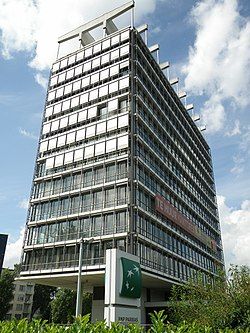BP Building (Antwerp)
| BP Building | |
|---|---|
 BP Building in 2012 | |
 | |
| Former names | Axa-Royale Belge Tower |
| General information | |
| Status | Completed |
| Type | Office |
| Architectural style | Modernism |
| Location | Antwerp, Belgium |
| Address | Jan van Rijswijcklaan 162 |
| Coordinates | 51°11′33″N 4°23′51″E / 51.1925°N 4.3975°E |
| Current tenants | Delen Private Bank; BNP Paribas Wealth Management; Notariskantoor Van Laere; Waterland Private Equity |
| Construction started | 1960 |
| Completed | 1963[1] |
| Owner | Buysse & Partners Smart Assets |
| Height | 187 feet (57 m) |
| Technical details | |
| Structural system | Cables and beams |
| Material | Concrete |
| Floor count | 12 |
| Design and construction | |
| Architect(s) | Léon Stynen |
| Other designers | Claude Blondel and Raymond Van Loo |
| Main contractor | Algemene Ondernemingen Widuwe Jerôme Van Coillie |
| References | |
| [2] | |
The BP Building, previously also known as the Axa-Royale Belge Tower, is a suspended-structure office building in Antwerp, Belgium, designed by the Belgian architect Léon Stynen. The building was completed in 1963 and features a unique cantilevered floor structure and cable supports. All of the floors are supported with external cables that are attached to roof beams: the weight of roof beams, all floors, and the external walls are carried by a center core. The building was commissioned by BP and is still referred to as the "BP Building", but is now owned by Buysse & Partners Smart Assets since 2018. Its architecture has been classified as Modernist and Brutalist.[3]
Design
[edit]In 1963, well-known Belgian architect Leon Stynen experimented with a technique which allowed a cantilevered facade. All of the floors and the facade of the building are held up with steel cables which are supported from rooftop beams. The design allows for a greater unobstructed interior space.[4] It was Europe's first building which made use of "suspended construction".[3]
The floors are supported by external cables, which allows each floor to have no internal columns. The ten floors are all similar and divided by interior wood-based walls. The facade is a type of curtain wall with metal grids. A restaurant is located on the upper level of the building.[5]
The center concrete columns are 57 metres (187 ft) tall, and in addition to supporting the stairway and the duct work, they also support the steel core of two 55-metre (180 ft) beams. Nine crossbeams, 18 metres (59 ft) long, run perpendicular to the two primary beams. Cables are then hung from the crossbeams, and these support the floors.[3]
-
Top section of the BP Building, showing cantilevered roof beams and suspension cables
Axa-Royale Belge Tower
[edit]The building was purchased by Axa Bank Belgium and renamed the Axa-Royale Belge Tower.[6][7] It underwent a major renovation and most of the original interior is now replaced.[3]
On 5 March 2001 the building was classified as an architectural monument based on historical and architectural value.[8]
Awards
[edit]1964 SBUAM Prize Société belge des Urbanistes et Architectes modernistes.[9]
References
[edit]- ^ "BP Building, Antwerp". tobebuild.archi. Archived from the original on 14 January 2022. Retrieved 8 January 2022.
- ^ "Emporis building ID 109000". Emporis. Archived from the original on 8 January 2022.
- ^ a b c d "BP-building". inventaris onroerenderfgoed. Onroerenderfgoed. 29 March 2019. Archived from the original on 14 January 2022. Retrieved 14 January 2022.
- ^ Winston, Anna (10 January 2019). "Five buildings by Belgian architect Léon Stynen that are worth visiting". Dezeen Magazine. Archived from the original on 29 December 2021. Retrieved 6 January 2022.
- ^ Van Balen, Koen; Verstrynge, Els (2016). Structural analysis of historical constructions : anamnesis, diagnosis, therapy, controls. United Kingdom: Taylor and Francis Group. p. 1658. ISBN 978-1-138-02951-4. Retrieved 8 January 2022.
- ^ "BP Building à Anvers" (PDF). Master Builders Solutions. MBCC Group. Archived (PDF) from the original on 30 January 2022. Retrieved 30 January 2022.
- ^ De Meyer, Paul. "BF Builiding [sic]". architectuul. Archived from the original on 14 January 2022. Retrieved 8 January 2022.
- ^ "BP-building". Inventaris Onroerenderfgoed. Onroerenderfgoed. 29 March 2019. Archived from the original on 14 January 2022. Retrieved 14 January 2022.
- ^ Acier - Volume 31. Asse, Belgium: Centre belgo-luxembourgeois d'information de l'acier. 1966. p. 309. Retrieved 14 January 2022.

